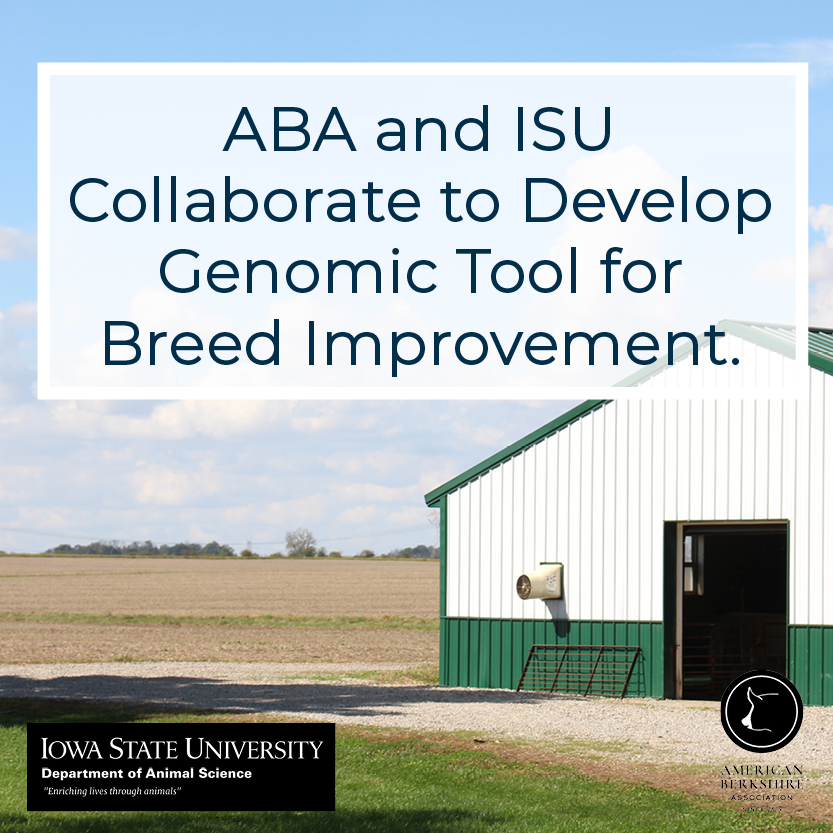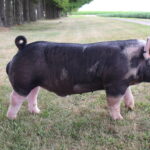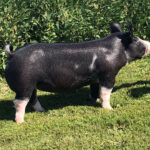
ABA and ISU Collaborate to Develop Genomic Tool for Breed Improvement
American Berkshire Association and Iowa State University Collaborate to Develop Genomic Tool for Breed Improvement
Another American breeding organization is joining the livestock breeding industries that apply genomic testing to aid in their selection decisions. The American Berkshire Association is partnering with Dr. Juan P. Steibel, Professor of Animal Science and J. Lush Endowed Chair of Animal Breeding and Genetics at Iowa State University to develop genomic testing methods for the breeders in ABA.
They will be using proven SNP chip technology that has been already adopted by other livestock breeders. These chips allow querying the genome of individual pigs at approximately 50,000 specific locations. The resulting genotypes will be used for breed composition estimation, parentage verification and for improving meat quality traits.
Breed composition testing or breed integrity verification has been performed by breeders for many years. For instance, in the past some breed associations have required performing sire test-mating to detect carriers of recessive alleles affecting coat color. Molecular markers at specific genes have also been used for this purpose. Moreover, DNA markers are routinely used by pig breeders to aid in selection for other traits, for instance, to select against carriers of alleles predisposing animals to Porcine Stress Syndrome. Finally, dense genomic markers are now routinely used for genomic prediction by many breeding organizations. This consists of the joint analysis of tens of thousands of marker genotypes, phenotypes, and pedigree records to predict the breeding value of selection candidates.
First Phase: population characterization, breed composition estimation and single locus analyses
In a first phase of this project, markers from a 50K SNP chip will be used to design breed integrity checks aimed at detecting crossbred animals and accurately estimating their Berkshire composition. To accomplish this, many registered purebred Berkshire animals will be genotyped and analyzed together with publicly available crossbred and purebred pig genotypes from other breeds to establish a Berkshire breed genomic reference profile. The output of this will be a computer application that will report the estimated % of Berkshire genome composition for any genotyped pig.
As part of this initial phase, additional information available in the genotyping chips will be exploited. For instance, genotypes at individual molecular markers related to Porcine Stress Syndrome, the RN gene (Napole), and for genes related to meat quality and growth will be reported for any genotyped animal. Individual breeders at ABA have been individually ordering and using some of these tests and now they will have access to these reports without incurring in extra genotyping costs. Finally, an important output of this phase will be a program for parentage testing, where genotypes from parent-offspring duos will receive a verified parentage badge. This will help in eliminating pedigree errors.
Second Phase: sire progeny testing and genomic prediction
The ABA has been performing sire progeny testing for both feedlot performance and several meat quality traits since 1991 through the National Barrow Show Progeny Test and the ABA Progeny Test.
As phase 1 of this project is completed and genomic testing for breed verification is adopted by ABA, the number of genotyped animals in the ABA pedigree is expected to skyrocket. The next phase of this project will connect the database of phenotypic records with genotypes and the existing pedigree (by now free from parentage errors using genotype data) to predict the genetic merit of traits that are central to the breeding goals of most Berkshire breeders, especially meat quality traits.




